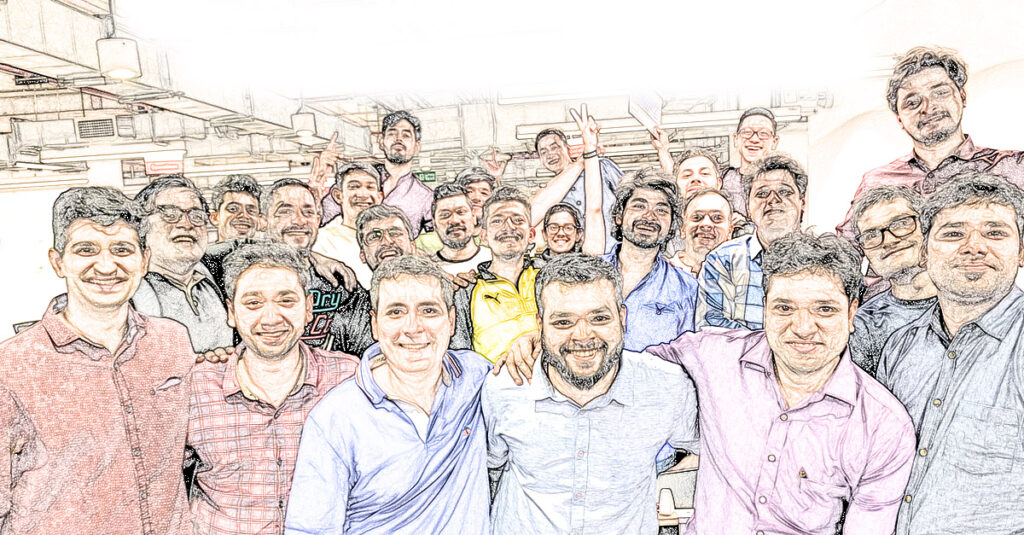One great early-stage hire can make a startup. WhiteHat Jr’s destiny would be completely different if I had a different CTO or the wrong first curriculum hires. A-players hire A-players, B-players hire B-players, and so forth, and a StartUp can’t afford a single B-Team in the early stages.
How do you build an A-Team from scratch in a startup?
Here I share some frameworks, including mistakes made, which I hope are useful for early-stage founders with big ambitions but limited resources to attract top talent. As well as for managers in any organization. For I’ve learnt over the years that the #1 question in an organization often isn’t
“What is to be done?”
Rather it is
“Who is doing it?”
The models below may be your guide to build an A-Team who’ll always “do it” right!
1. Your “20/4” Commitment to Attract Top Talent
People join a startup for only 2 reasons in early stages when brand, culture etc. is still being defined:
A. Your Mission
B. Their Growth
Are you inspiring folks with your Big & Obvious mission well? Then, you’re almost there. Now, they just need to develop conviction in their own big growth in line with your big mission.
I committed a 20/4 principle to every new hire in our early stages:
“We will replace 20 years of low-intensity work with 4 years of high-intensity work. ”
And you’ll compress 20 years of personal and professional growth in these 4 years.
StartUps = Mission and Growth.
And you need complete conviction in both. The founder’s passion can move mountains–or at-least get top tech talent to move from Bangalore to Mumbai!

Demonstrate, then deliver, complete conviction in growth. Your employees will sacrifice security, locations, lives, to join your mission; you owe them an all-in chance at “20/4” growth.
Bonus: For early-stage ESOP allocation, please see this post.
2. Know the “80/20” Talent Prototypes that Work
I found the following prototypes useful to have in a startup, which is growing explosively through phases, over and above the deep, functional experts you’ll hire:
- 0-1 “Creation Phase”: The Hacker, The Designer and The Marketer
Our first engineering VP was a hacker since 8th grade, a fact that stood out in our interview. I’d met many seasoned, pedigreed folks but Phase 1 needs manic daily iteration, as much if not more than structural solidity. Your ideal 0-1 team is:
“The Designer”-Zero-to-one creative thinkers, who design the product. For us, our curriculum was the product and the first set of “designers” were techies with maverick creative sides, for example a self-taught coder who had dropped out of school to teach kids.
“The Hacker”– Hands-on coder who launches product rapidly to get user feedback. We launched new versions every 2 weeks.
“The Marketer”-Facebook/Google Expert for rapid targeting and creative testing to know what users are reacting to and tweaking the product accordingly.
Plus the founder as the first sales manager, understanding how everything comes together. We had a combination of only the above skills in the 1st 10 folks of the company to create a product ready-for-scale.
- 1-100 “Definition Phase”: Management Consultant + PM + EM
You’ll have a bewildering array of new questions daily when you start scaling. Should you outsource your call center or keep it in-house? Which CRM system to use? How to recruit and train hundreds of sales and operations folks each month? Many of these problems will be new-to-the-world if you’re building a new category. And I found this ace combination get robust solutions to all tough problems:
Management consultant + Product Manager + Engineering Manager
Management consultants (eg MBB: McKinsey, BCG, Bain) are extraordinary in scoping and managing ambiguous projects; Product Leaders build systems for scale versus attack projects as one-off; and Engineering of-course is the bedrock of everything in a startup. We put this combo together in every seemingly unsolvable situation and almost always, magic happened!
- 100-1000 “Blitzscaling Phase”: Manufacturing Leader
I greatly valued folks who’d run plants and factories at P&G, ITC, Unilever etc. in the blitz-scaling phase. We had our recruiters reach out non-stop to them to quit running plants and start building tech! Because whether you’re adapting Maths curriculum to Brazil or recruiting thousands of music teachers in a month, everything is a process. And each process has to run with six-sigma or zero-defect precision. Operations is the fulcrum of scaling. And manufacturing leaders are exceptionally qualified for that-if you can convince them to change career tracks to join you!

3. The “3,3,3” Recruiting Rule
(Your Leverage)= (Your Team) x (Your Team’s Leverage)
A founder’s single biggest leverage in the company is to build a great team so I spent inordinate time recruiting, following this 3×3 rule:
- 3 Recruiters: I was in direct touch with 3 recruiters, exchanging hundreds of WhatsApp messages with them, through the 3 years of running the company. None of them were the usual marquee names eg Korn Ferry, Michael Page etc, but they understood our values, our speed, our energy deeply–and grew with us.

I highly recommend having few, key deep recruiting relationships, helmed by an ace in-house management recruiter, to get first access to top talent. Please post in the comments below if you’d like me to make introductions.
UPDATE: Kindly reach out to these recruiters who helped me recruit 40-50 middle and senior management leaders, including COO, CTO, in record timing and show the same 24×7 zeal as founders:
1. Tarun Bhargava: tarun.bhargava@talentgen.co.in https://www.linkedin.com/in/tarun-bhargava-90316421/
2. Gorakh: Gorakh@vedaconsulting.co.in https://www.linkedin.com/in/gorakh-tiwari-9b4bb83/
3. Prashant Sardana: prashant.sardana@steergrowth.in https://www.linkedin.com/in/prashant-sardana-611b5425/
- 3 interview Questions: These 3 questions, among others, helped me gauge for startup fit:
A. What are your improvement areas?
Rationale: Startups are brutal and folks with low self-awareness struggle to learn fast. Reject anyone who gives superficial answers eg “I’m not good at promoting myself”, “I have to learn to network more” etc.
B. Where can our business model go wrong?
Rationale: Your best hires will be the ones who believe in the mission but challenge the founder’s irrational conviction often! The answer to this question shows both preparation depth and independent thinking.
C. What are you reading/learning now?
Rationale: The best folks are always learning/striving to get better. Anyone who draws a blank at this will likely not have the continuous curiosity needed for a startup.
- 3 References: I’d call candidate references myself to get a three-dimensional sense of the hire. References are golden. I’d often ask references whether they’d rate the employee among the Top 1%, 5%, 10%, 25%, 50% etc. of people they’ve ever worked with. I knew less than Top 10% wouldn’t work for the pace I was setting.
 Finally, what are the biggest Hiring Mistakes I made?
Finally, what are the biggest Hiring Mistakes I made?
The Founder’s Strength becomes the weakness of the company.
A founder typically hires last for the functions he/she is experienced in, thinking they can run the function easily. But a founder’s role is unlike any you’ve done before.
You’re Creating and Running the wheel daily.
Versus just running the wheel, as you do in an established organization.
You have no time to run any one function and I made several, key mistakes here:
- Mistake #1: I came from consumer goods and ran a stable, 20 year-old organization like Discovery so I didn’t prioritize marketing, systems etc as I thought it’d be easy to set up when it was time. It was never time! I should’ve hired those leaders early versus hiring only to offset my lack of experience in product, tech, curriculum etc.
- Mistake #2: We hired a dedicated Organization Development and Culture lead when we were thousands of employees in. Big Mistake. We should’ve hired a culture lead at 250+ employees to set an intentional culture from the start.
Lessons for Founders: Hire for both your own strengths and your culture early, versus just your knowledge gaps.
The above is an oversimplification, of course. Startups move in and out of phases and some of our best folks didn’t follow the paradigms above. But if you have enough sampling of the diverse prototypes and strategies above, you’ll be able to solve every problem in your organization.
Just hire A-players always.
Until then, keep the role open, patiently. One wrong hire can set you back months, which is life-or-death for a startup.
“But if you don’t find an intelligent companion, a wise and well-meaning person, going the same way as yourself, then walk alone. Like a king abandoning a conquered kingdom or like a great elephant in the deep forest. It is better to be alone than to be with those who will hinder your progress.”
– The Buddha

Was this helpful to build your A-Team? Do drop me a note in the comment to let me know. Also, let me know in the comments if you have other questions on building early-stage teams and/or want introductions to the ace early stage start-up recruiters I referenced here.
My best always!
And if you found this useful, you may also like this new YT Video (<5 Minutes) on the Top 3 Startup Advice I Found Most Useful.
Please subscribe to the channel here for 3x new videos/week on startup and success models.

 Finally, what are the biggest Hiring Mistakes I made?
Finally, what are the biggest Hiring Mistakes I made?















58 Comments